【BBC六分钟英语】我们是不是越来越容易过敏了?
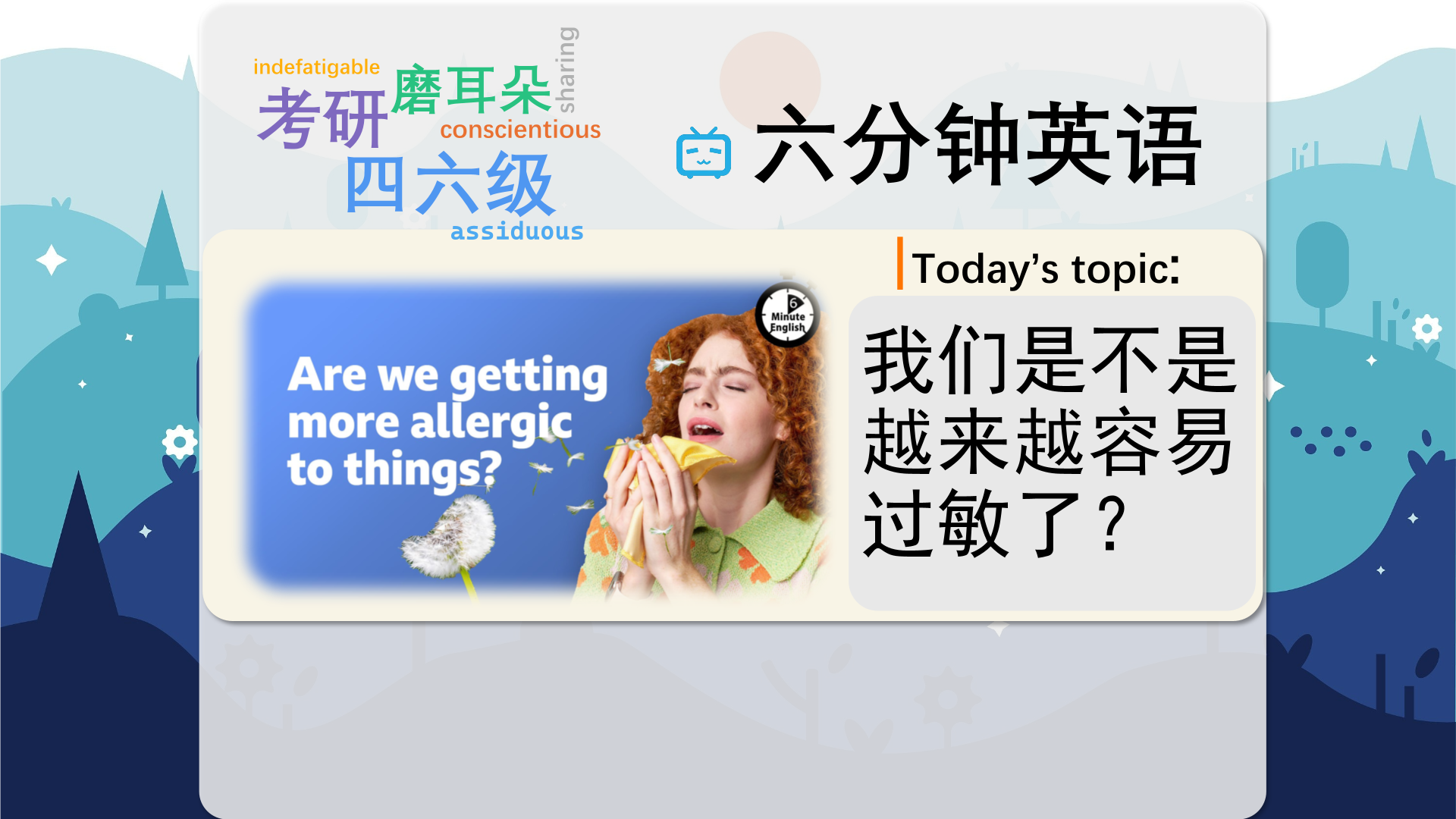
【英文脚本】
Beth
Hello and welcome to 6 Minute English from BBC Learning English. I’m Beth.
Neil
And I’m Neil. In this episode, we’re talking about allergies. Allergies are when a certain food or material makes you feel sick. Do you have any allergies, Beth?
Beth
Yeah, so I am actually allergic to dairy so I can’t have anything with milk. So, no cheese, no butter. What about you, Neil? Have you got any allergies?
Neil
Well, I’m not great with dairy either, but it’s not an allergy – more of an intolerance. So, it just makes me feel a bit bad rather than actually making me sick. But I do have hay fever, so I’m allergic to pollen. That means in the summer months I’m sneezing and coughing all the time. I get runny eyes and a runny nose, and it also gives me a little bit of asthma, so it’s a bit of a pain.
Beth
Oh yeah, that sounds really horrible. Now, scientific evidence shows that more people are developing allergies. In this programme we’re going to find out about what it’s like living with an allergy and where in the world has the highest rate of allergies.
Neil
But first, I have a question for you, Beth. What is the most common allergy in the world? Is it: a) Peanuts? b) Pollen? Or c) Dairy?
Beth
I’m going to say pollen. A lot of people I know have hay fever.
Neil
Including me. Well, we’ll find out the answer at the end of the show. Now, Beth, you’re allergic to dairy, but imagine if you had over 50 allergies. That’s the situation for Mia Silverman, who runs a social media account, Allergies with Mia, where she talks about living with lots of allergies.
Mia Silverman
My 50+ allergies include all nuts and their oils. I’m allergic to all fish except for cooked tuna and cooked codfish.
Beth
Life for Mia involves a lot of planning, as she told BBC World Service programme, What in the World.
Mia Silverman
And having these 50+ allergies impacts my life every single day. So, when it comes to going to restaurants: having to call ahead of time, talk to the manager, talk to the chef, make sure that the restaurant can accommodate me, that they can make me something safe and use protocols to prevent any sort of risk of any allergens touching my dish. When it comes to socialising, it can be kind of hard sometimes, because I want to make sure that my friends don’t feel inconvenienced or feel like I’m being a burden.
Neil
If Mia wants to go to a restaurant, she has to call ahead of time to tell them about her allergies. If you call ahead of time, you phone somewhere, like a restaurant before you go. We can also say call ahead.
Beth
Mia needs to find out whether restaurants can accommodate her allergies. Accommodate in this context means give someone what they need.
Neil
Because Mia has so many allergies, she has to visit restaurants which have protocols to stop the food she is allergic to touching her meal. Protocols means a set of rules for a process, to make sure things are done properly.
Beth
Now, most people who have allergies don’t have as many as Mia, but scientists believe more people are developing allergies. And there is one place where the number of allergies is particularly high: Australia.
Neil
In fact, Australia is called the allergy capital of the world. When we describe somewhere as the capital of the world in something, we mean that it is known for that thing. So, the allergy capital of the world is the place in the world with the most allergies.
Beth
BBC journalist Frances Mao is from Australia and explains some of the allergy data to BBC World Service podcast, What in the World.
Interviewer
You’re from Australia, which has been called the allergy capital of the world. What is it about Australia in particular that is making people more allergic?
Frances Mao
Australia’s termed the allergy capital of the world because, due to the research and the data, that shows that almost one in 10 infants have marked an allergy. And often that’s a food allergy or a respiratory allergy. And that does drop off once they’re a bit older. Age six or so it goes down to about 6%, and then as an adult it goes down to like 3%.
Neil
Frances talks about the high numbers of Australian infants, that’s babies, who have allergies. But she says the numbers drop off as children get older. If numbers or rates of something drop off, they get lower.
Beth
By age six or so, Australian children are less likely to have allergies. We can use or so in informal speech to show that the number is an estimate: it’s not exact.
Neil
So Beth, is there anything we can do about all these allergies?
Beth
Well, scientists are investigating giving babies vitamin D, which can be shown to reduce allergies. Another technique is immunotherapy, which involves scientists giving children tiny amounts of the thing they are allergic to and then building up their baby’s tolerance.
Neil
Interesting! And I think it’s time to find out the answer to my question. I asked you, ‘What is the most common allergy in the world?’
Beth
I said pollen. Was I right?
Neil
You were right. Well done!
Beth
OK, let’s recap the vocabulary we’ve learned, starting with call ahead of time, which means to phone somewhere, like a restaurant, before your appointment or before you go there.
Neil
If you accommodate someone, you give them what they need.
Beth
Protocols are strict rules for how something is done.
Neil
If somewhere is the capital of the world for a particular thing, it is known for that thing. For example, London is sometimes called the theatre capital of the world because we have lots of theatres.
Beth
If numbers drop off, it means they get lower.
Neil
And we can add or so to a number in informal speech to show that the number is an estimate: it’s not exact.
Beth
Once again, our six minutes are up. But you can test your knowledge even more using the interactive quiz on our website – visit bbclearningenglish.com.
Neil
Bye for now!
Beth
Bye!
【中英文双语脚本】
Beth(贝丝)
Hello and welcome to 6 Minute English from BBC Learning English. I’m Beth.
您好,欢迎来到 BBC Learning English 的 6 Minute English。我是贝丝。
Neil(尼尔)
And I’m Neil. In this episode, we’re talking about allergies. Allergies are when a certain food or material makes you feel sick. Do you have any allergies, Beth?
我是 Neil。在这一集中,我们谈论的是过敏。过敏是指某种食物或材料让您感到不适。贝丝,你有什么过敏症吗?
Beth(贝丝)
Yeah, so I am actually allergic to dairy so I can’t have anything with milk. So, no cheese, no butter. What about you, Neil? Have you got any allergies?
是的,所以我实际上对乳制品过敏,所以我不能吃任何含牛奶的东西。所以,没有奶酪,没有黄油。你呢,尼尔?你有什么过敏症吗?
Neil(尼尔)
Well, I’m not great with dairy either, but it’s not an allergy – more of an intolerance. So, it just makes me feel a bit bad rather than actually making me sick. But I do have hay fever, so I’m allergic to pollen. That means in the summer months I’m sneezing and coughing all the time. I get runny eyes and a runny nose, and it also gives me a little bit of asthma, so it’s a bit of a pain.
嗯,我也不擅长乳制品,但这不是过敏 —— 更多的是一种不耐受。所以,它只是让我感觉有点难过,而不是真的让我生病。但我确实得了花粉症,所以我对花粉过敏。这意味着在夏季的几个月里,我一直在打喷嚏和咳嗽。我流眼泪和流鼻涕,还让我有点哮喘,所以有点痛。
Beth(贝丝)
Oh yeah, that sounds really horrible. Now, scientific evidence shows that more people are developing allergies. In this programme we’re going to find out about what it’s like living with an allergy and where in the world has the highest rate of allergies.
哦,对了,这听起来真的很可怕。现在,科学证据表明,越来越多的人患上过敏症。在这个节目中,我们将了解过敏症患者的生活是什么感觉,以及世界上过敏率最高的地方。
Neil(尼尔)
But first, I have a question for you, Beth. What is the most common allergy in the world? Is it: a) Peanuts? b) Pollen? Or c) Dairy?
但首先,我有一个问题要问你,贝丝。世界上最常见的过敏症是什么?是:a) 花生?b) 花粉?或 c) 乳制品?
Beth(贝丝)
I’m going to say pollen. A lot of people I know have hay fever.
我要说的是花粉。我认识的很多人都患有花粉症。
Neil(尼尔)
Including me. Well, we’ll find out the answer at the end of the show. Now, Beth, you’re allergic to dairy, but imagine if you had over 50 allergies. That’s the situation for Mia Silverman, who runs a social media account, Allergies with Mia, where she talks about living with lots of allergies.
包括我。好吧,我们将在节目结束时找到答案。现在,贝丝,你对乳制品过敏,但想象一下,如果你有 50 多种过敏症。这就是米娅·西尔弗曼 (Mia Silverman) 的情况,她经营着一个社交媒体账户 Allergies with Mia,她在其中谈到了很多过敏症的生活。
Mia Silverman(米娅·西尔弗曼)
My 50+ allergies include all nuts and their oils. I’m allergic to all fish except for cooked tuna and cooked codfish.
我的 50+ 过敏症包括所有坚果及其油。我对所有鱼都过敏,除了煮熟的金枪鱼和煮熟的鳕鱼。
Beth(贝丝)
Life for Mia involves a lot of planning, as she told BBC World Service programme, What in the World.
Mia 的生活涉及很多计划,正如她在 BBC 世界服务节目 What in the World 中所说的那样。
Mia Silverman(米娅·西尔弗曼)
And having these 50+ allergies impacts my life every single day. So, when it comes to going to restaurants: having to call ahead of time, talk to the manager, talk to the chef, make sure that the restaurant can accommodate me, that they can make me something safe and use protocols to prevent any sort of risk of any allergens touching my dish. When it comes to socialising, it can be kind of hard sometimes, because I want to make sure that my friends don’t feel inconvenienced or feel like I’m being a burden.
而这 50+ 过敏症每天都在影响我的生活。所以,当谈到去餐厅时:必须提前打电话,与经理交谈,与厨师交谈,确保餐厅可以容纳我,他们可以为我提供安全的食物,并使用协议来防止任何过敏原接触我的菜肴的任何风险。说到社交,有时可能会有点困难,因为我想确保我的朋友不会感到不便或觉得我是一个负担。
Neil(尼尔)
If Mia wants to go to a restaurant, she has to call ahead of time to tell them about her allergies. If you call ahead of time, you phone somewhere, like a restaurant before you go. We can also say call ahead.
如果 Mia 想去餐厅,她必须提前打电话告诉他们她的过敏情况。如果您提前打电话,您可以在出发前打电话给某个地方,比如餐馆。我们也可以说提前打电话。
Beth(贝丝)
Mia needs to find out whether restaurants can accommodate her allergies. Accommodate in this context means give someone what they need.
Mia 需要了解餐厅是否可以满足她的过敏症。在这种情况下,Accommodate 的意思是给某人他们需要的东西。
Neil(尼尔)
Because Mia has so many allergies, she has to visit restaurants which have protocols to stop the food she is allergic to touching her meal. Protocols means a set of rules for a process, to make sure things are done properly.
因为 Mia 有很多过敏症,所以她不得不去那些有协议的餐厅,以阻止她对食物过敏。协议是指一个进程的一组规则,以确保事情正确完成。
Beth(贝丝)
Now, most people who have allergies don’t have as many as Mia, but scientists believe more people are developing allergies. And there is one place where the number of allergies is particularly high: Australia.
现在,大多数过敏症患者的过敏症没有 Mia 那么多,但科学家们认为,越来越多的人正在发展为过敏症。有一个地方的过敏数量特别多:澳大利亚。
Neil(尼尔)
In fact, Australia is called the allergy capital of the world. When we describe somewhere as the capital of the world in something, we mean that it is known for that thing. So, the allergy capital of the world is the place in the world with the most allergies.
事实上,澳大利亚被称为世界过敏之都。当我们在某物中将某个地方描述为世界之都时,我们的意思是它以该事物而闻名。所以,世界过敏之都是世界上过敏最多的地方。
Beth(贝丝)
BBC journalist Frances Mao is from Australia and explains some of the allergy data to BBC World Service podcast, What in the World.
BBC记者Frances 毛来自澳大利亚,她向BBC世界服务播客What in the World解释了一些过敏数据。
Interviewer(访问者)
You’re from Australia, which has been called the allergy capital of the world. What is it about Australia in particular that is making people more allergic?
您来自澳大利亚,这里被称为世界过敏之都。特别是澳大利亚的哪些方面使人们更加过敏?
Frances Mao(弗朗西斯·毛)
Australia’s termed the allergy capital of the world because, due to the research and the data, that shows that almost one in 10 infants have marked an allergy. And often that’s a food allergy or a respiratory allergy. And that does drop off once they’re a bit older. Age six or so it goes down to about 6%, and then as an adult it goes down to like 3%.
澳大利亚被称为世界过敏之都,因为根据研究和数据,这表明几乎每 10 个婴儿中就有一个出现过敏症状。这通常是食物过敏或呼吸道过敏。一旦他们长大一点,这种情况就会下降。6 岁左右,它下降到 6% 左右,然后成年后下降到 3% 左好的。
Neil(尼尔)
Frances talks about the high numbers of Australian infants, that’s babies, who have allergies. But she says the numbers drop off as children get older. If numbers or rates of something drop off, they get lower.
Frances 谈到澳大利亚有大量婴儿患有过敏症。但她说,随着孩子年龄的增长,这个数字会下降。如果某物的数量或速率下降,它们就会降低。
Beth(贝丝)
By age six or so, Australian children are less likely to have allergies. We can use or so in informal speech to show that the number is an estimate: it’s not exact.
到 6 岁左右时,澳大利亚儿童过敏的可能性较小。我们可以在非正式场合使用 or so 来表明这个数字是一个估计值:它并不精确。
Neil(尼尔)
So Beth, is there anything we can do about all these allergies?
那么贝丝,我们能对所有这些过敏做些什么吗?
Beth(贝丝)
Well, scientists are investigating giving babies vitamin D, which can be shown to reduce allergies. Another technique is immunotherapy, which involves scientists giving children tiny amounts of the thing they are allergic to and then building up their baby’s tolerance.
好吧,科学家们正在研究给婴儿服用维生素 D,这可以证明可以减少过敏。另一种技术是免疫疗法,它涉及科学家给孩子服用微量他们过敏的东西,然后建立婴儿的耐受性。
Neil(尼尔)
Interesting! And I think it’s time to find out the answer to my question. I asked you, ‘What is the most common allergy in the world?’
有趣!我认为是时候找出我问题的答案了。我问你,’世界上最常见的过敏症是什么?
Beth(贝丝)
I said pollen. Was I right?
我说花粉。我是对的吗?
Neil(尼尔)
You were right. Well done!
你是对的。干的好!
Beth(贝丝)
OK, let’s recap the vocabulary we’ve learned, starting with call ahead of time, which means to phone somewhere, like a restaurant, before your appointment or before you go there.
好,让我们回顾一下我们学到的词汇,从 call ahead of time 开始,意思是在你预约之前或去那里之前给某个地方打电话,比如餐馆。
Neil(尼尔)
If you accommodate someone, you give them what they need.
如果你容纳某人,你就会给他们他们需要的东西。
Beth(贝丝)
Protocols are strict rules for how something is done.
协议是关于如何完成某事的严格规则。
Neil(尼尔)
If somewhere is the capital of the world for a particular thing, it is known for that thing. For example, London is sometimes called the theatre capital of the world because we have lots of theatres.
如果某个地方是某个特定事物的世界首都,那么它就是为该事物所知的。例如,伦敦有时被称为世界戏剧之都,因为我们有很多剧院。
Beth(贝丝)
If numbers drop off, it means they get lower.
如果数字下降,则意味着它们会变得更低。
Neil(尼尔)
And we can add or so to a number in informal speech to show that the number is an estimate: it’s not exact.
我们可以在非正式场合给一个数字加上 or so 来表明这个数字是一个估计值:它并不精确。
Beth(贝丝)
Once again, our six minutes are up. But you can test your knowledge even more using the interactive quiz on our website – visit bbclearningenglish.com.
我们的六分钟又结束了。但是,您可以使用我们网站上的交互式测验来更多地测试您的知识 - 访问 bbclearningenglish.com。
Neil(尼尔)
Bye for now!
再见!
Beth(贝丝)
Bye!
再见!

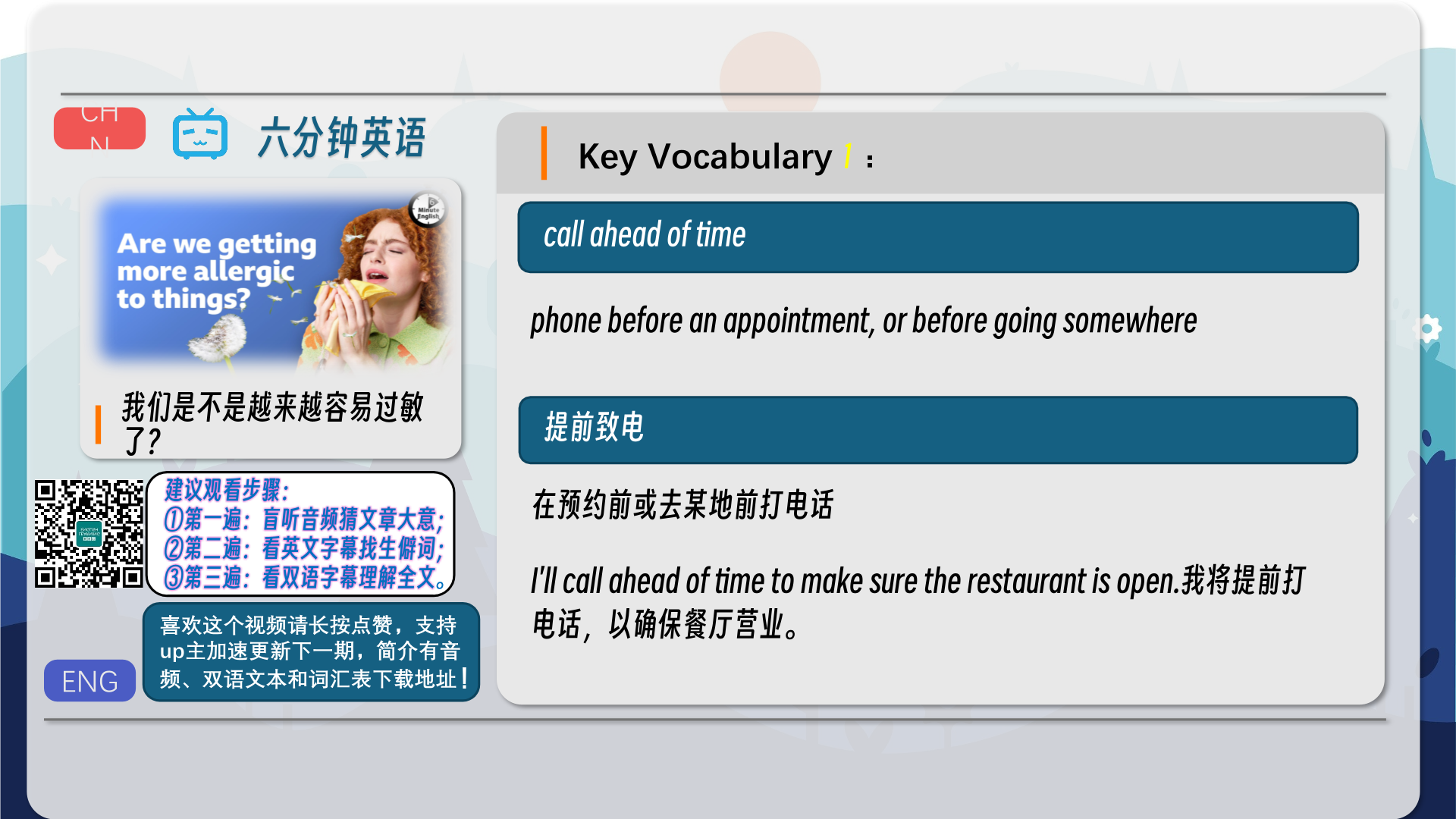
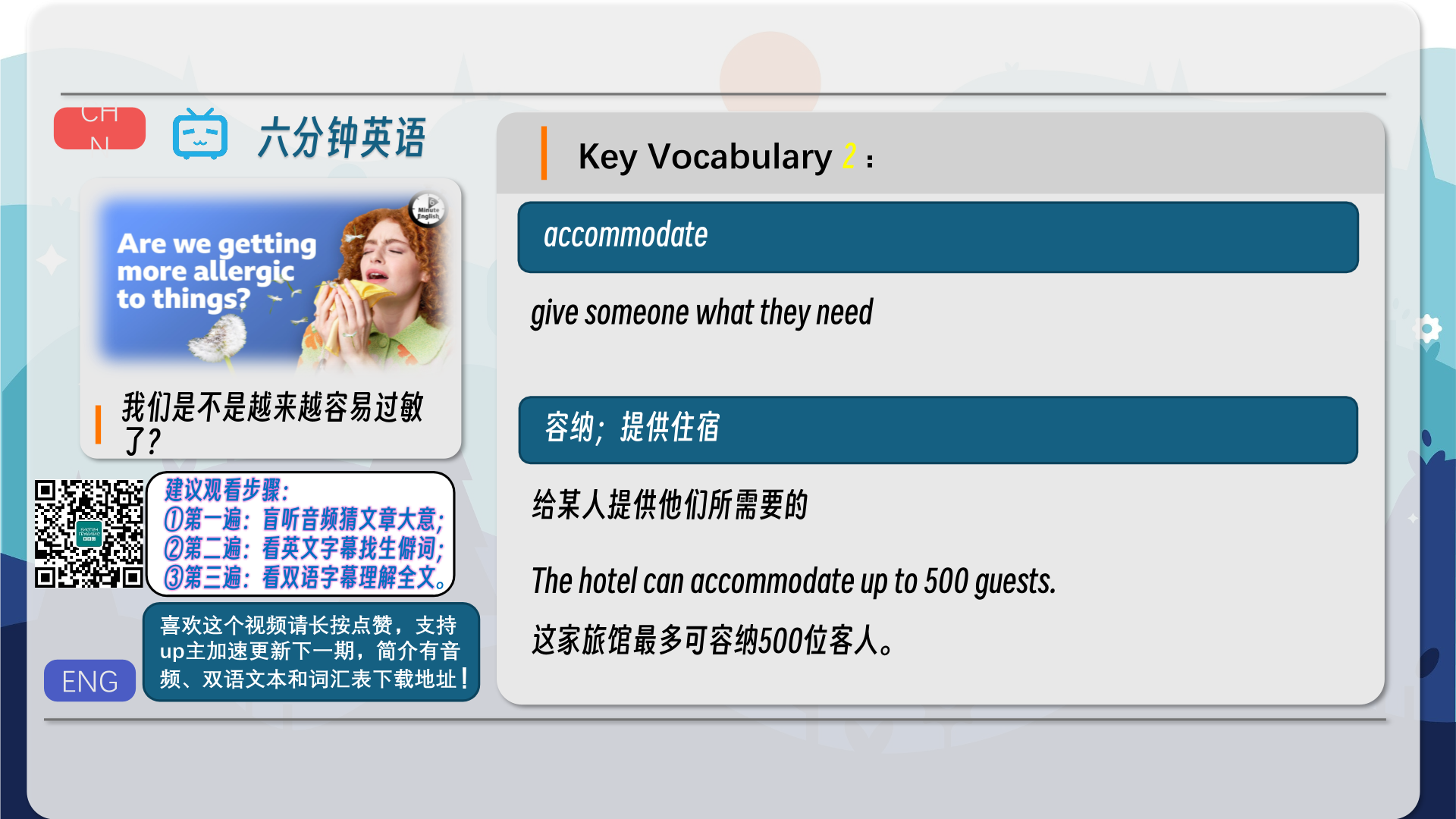
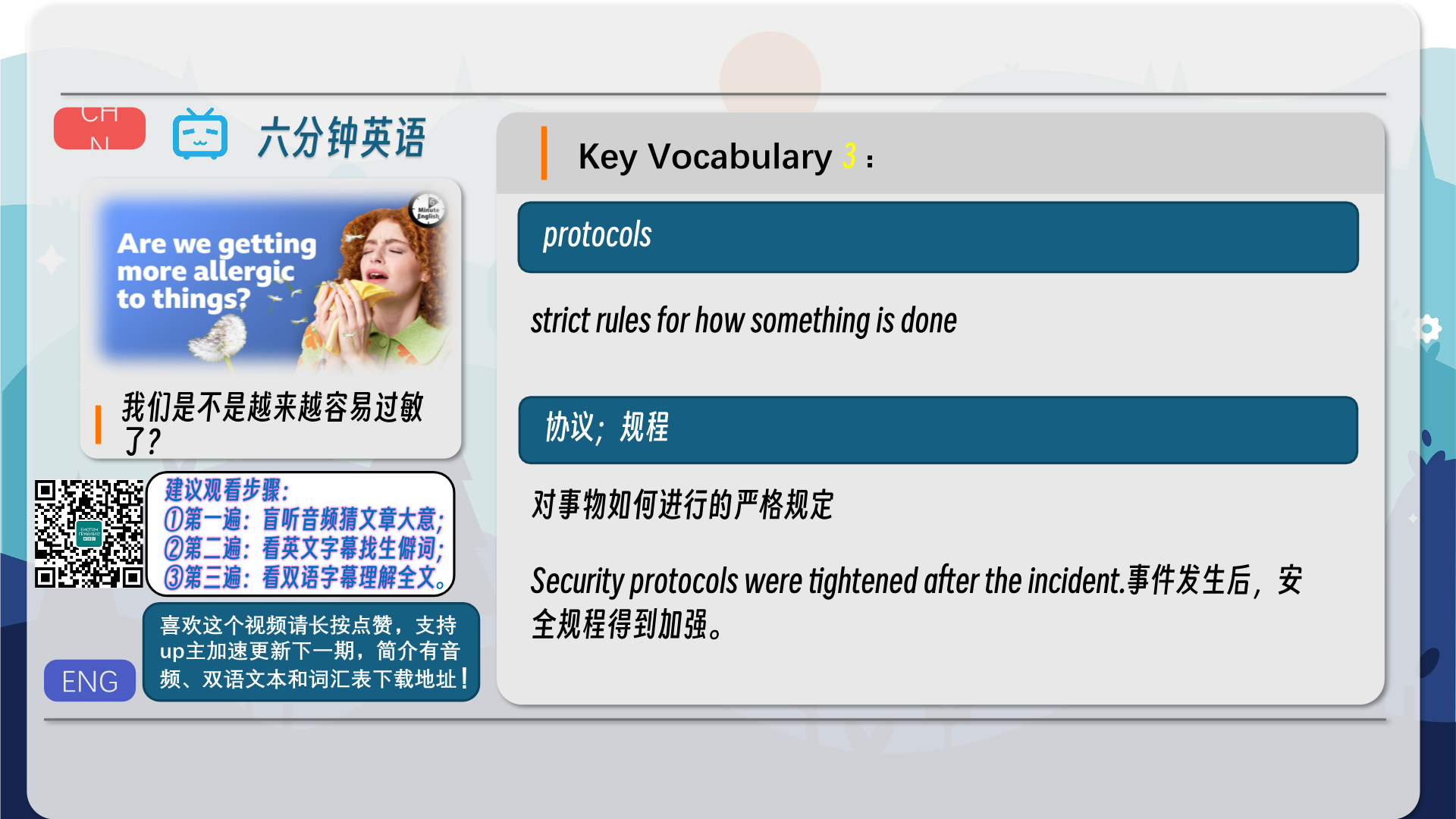
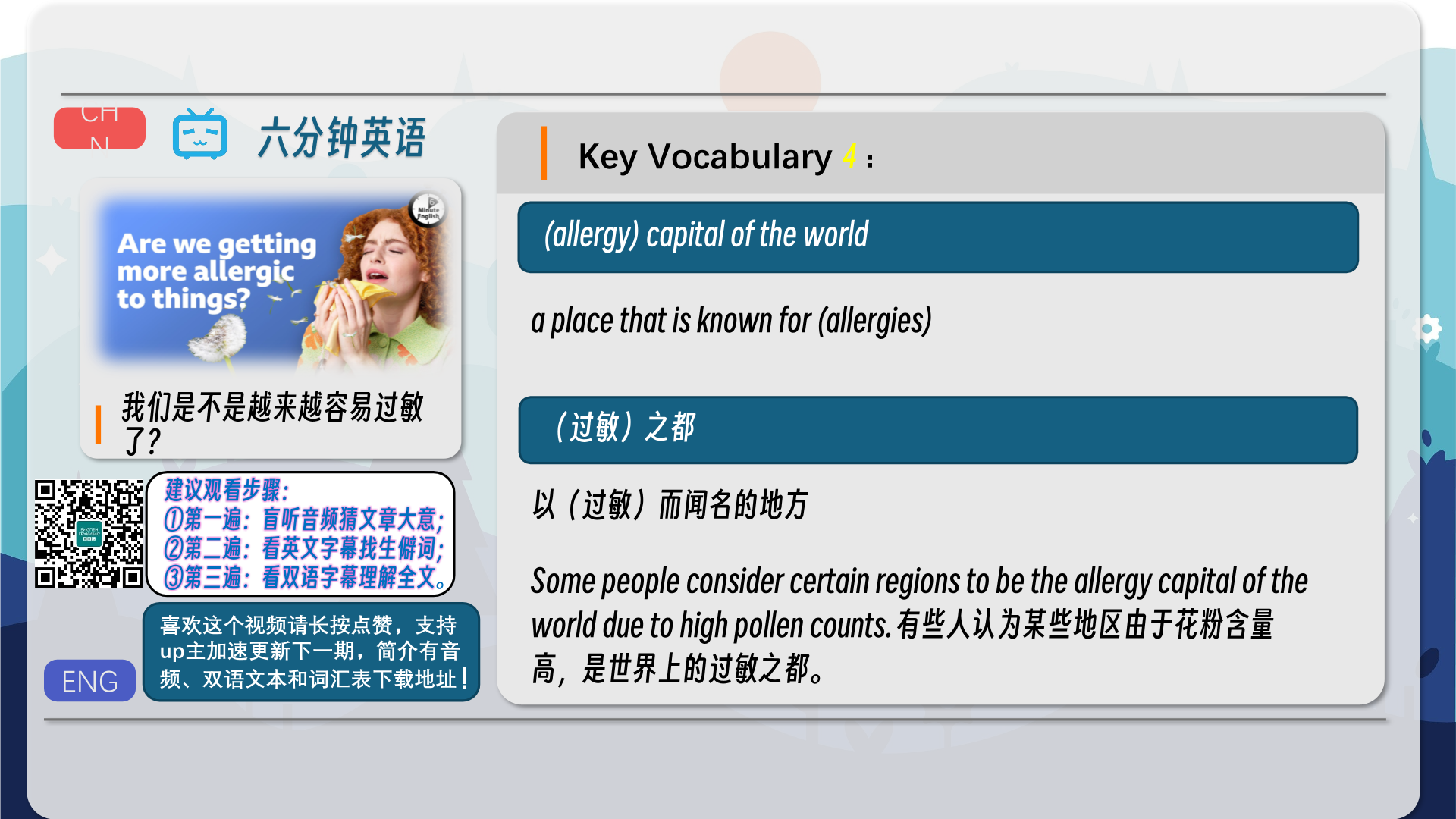
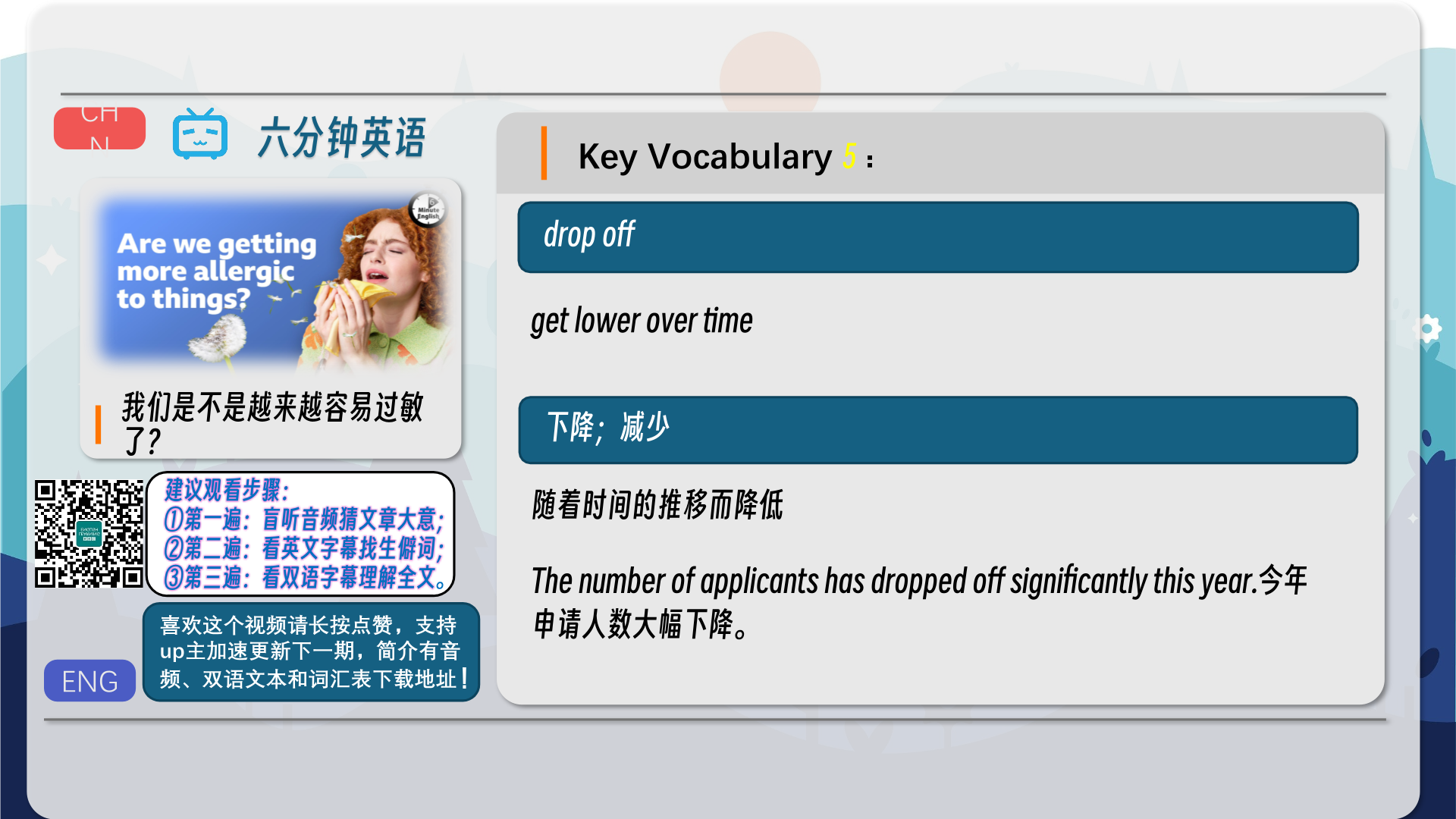
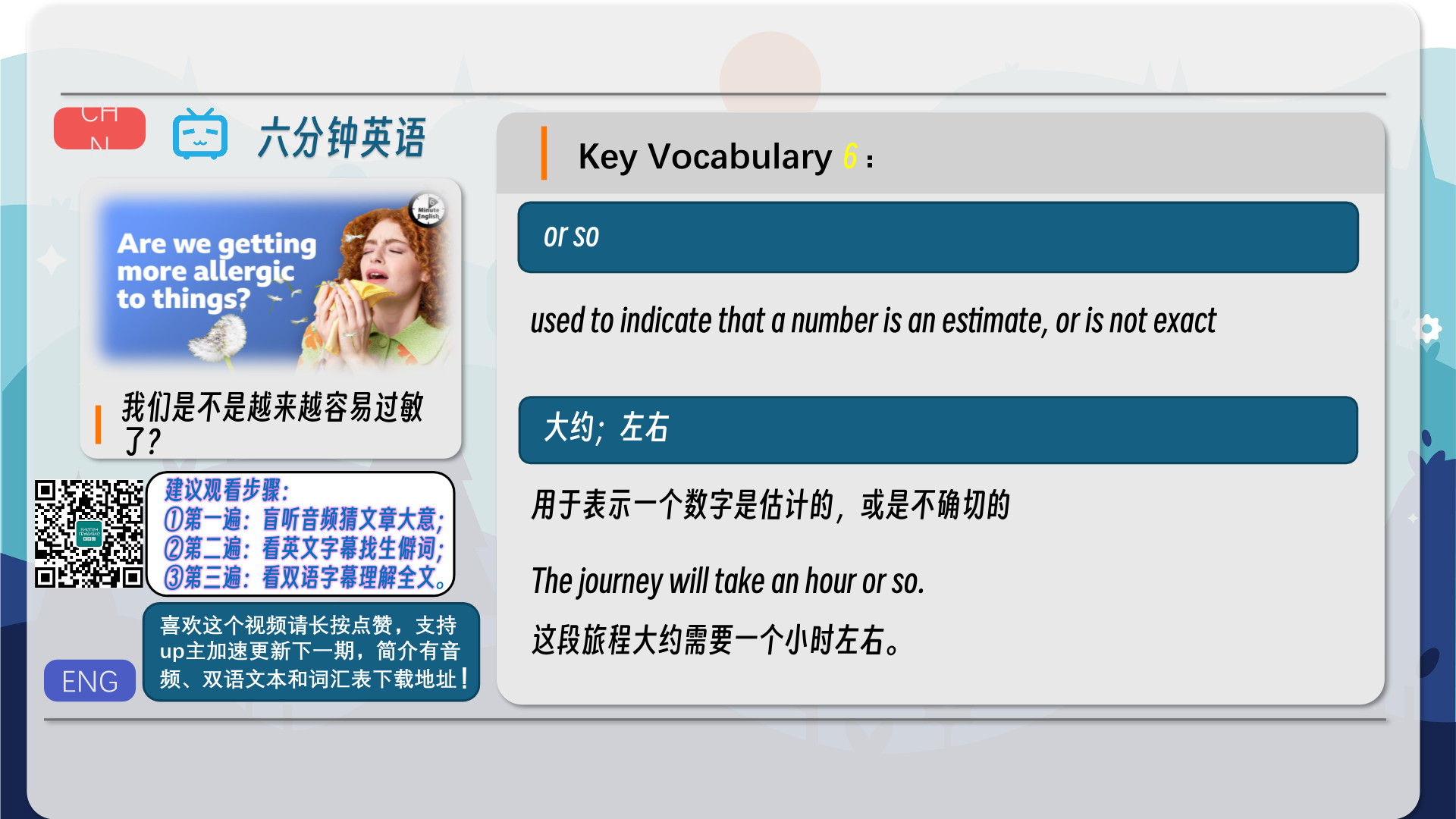
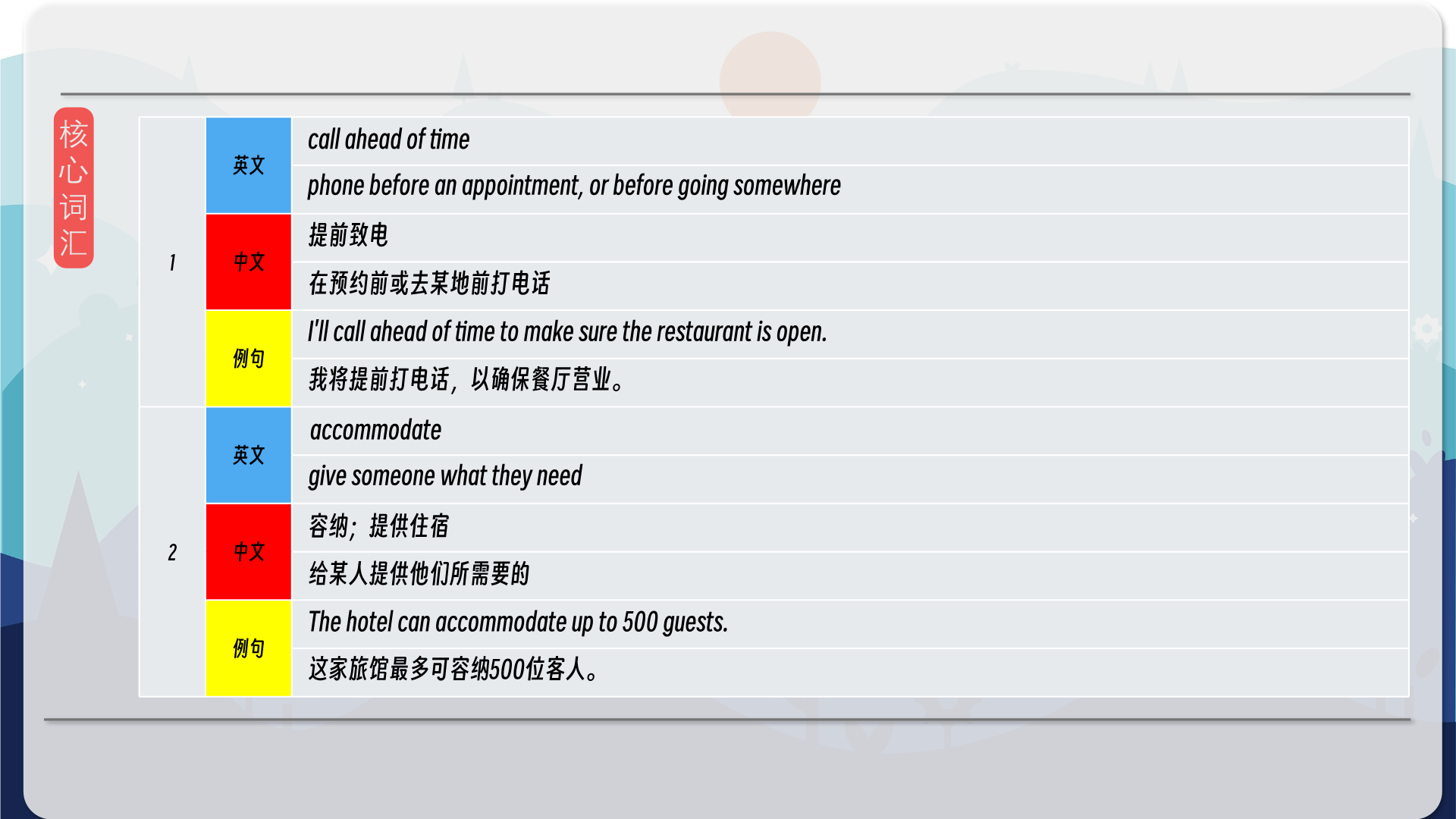
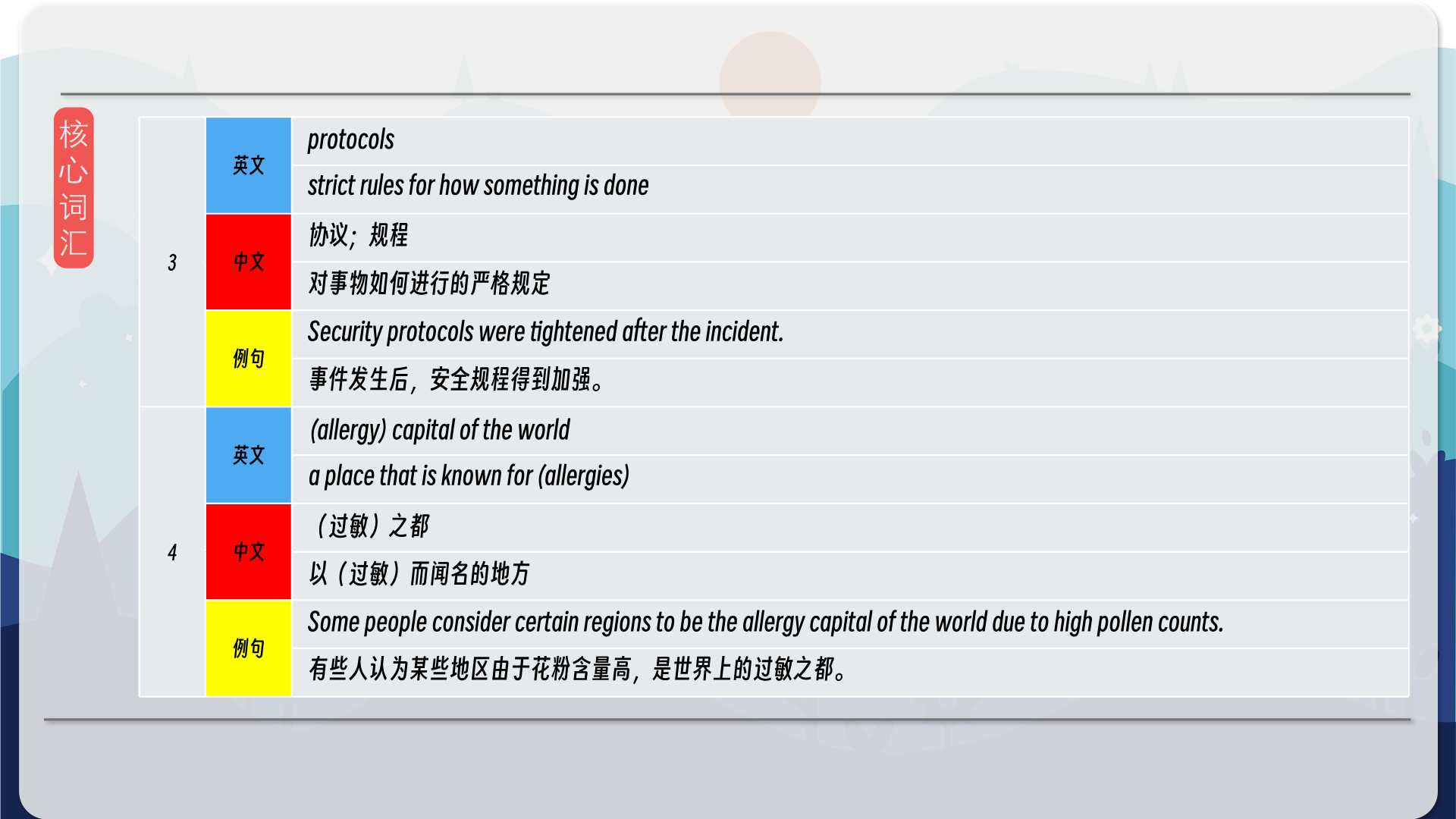
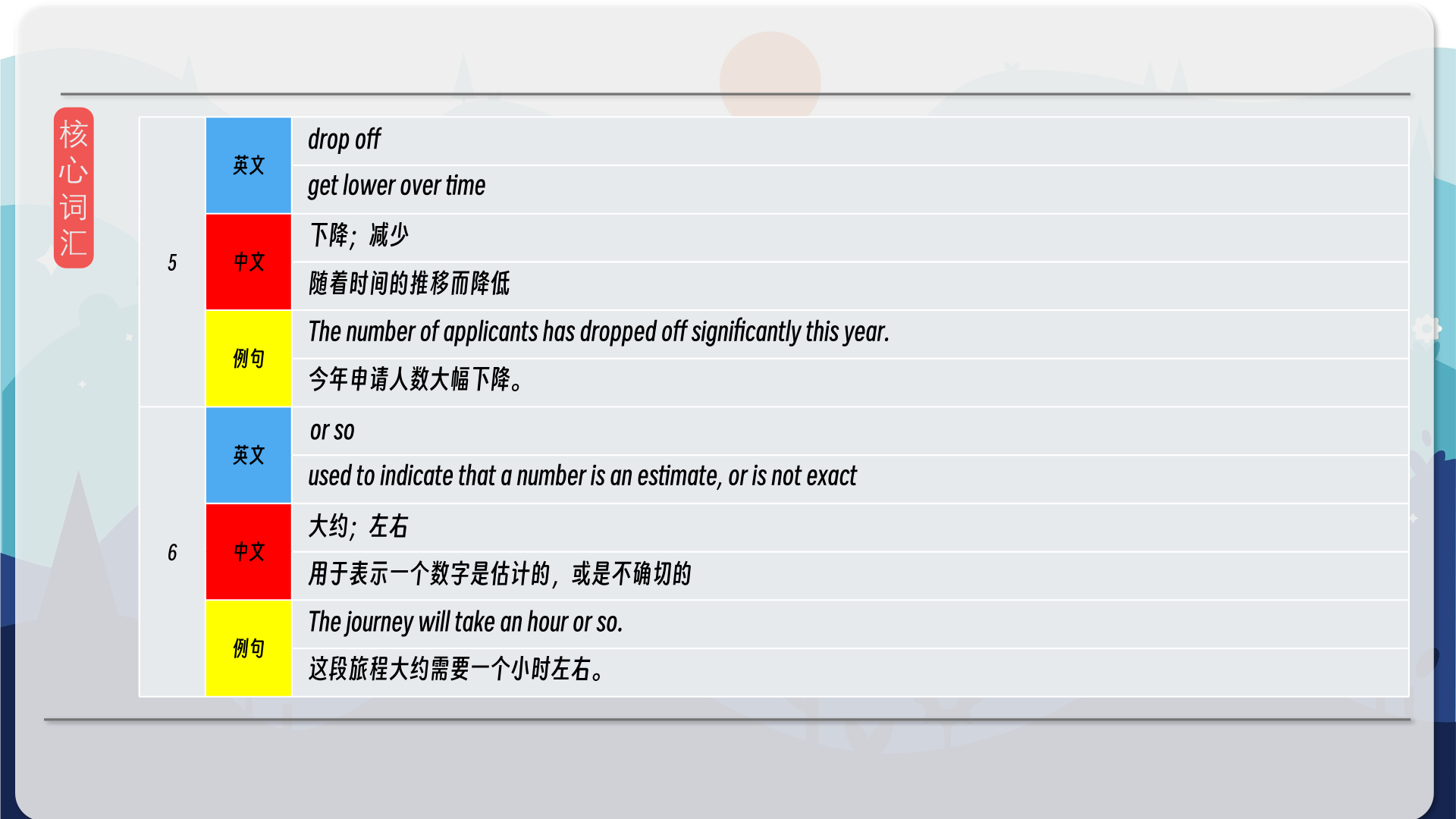
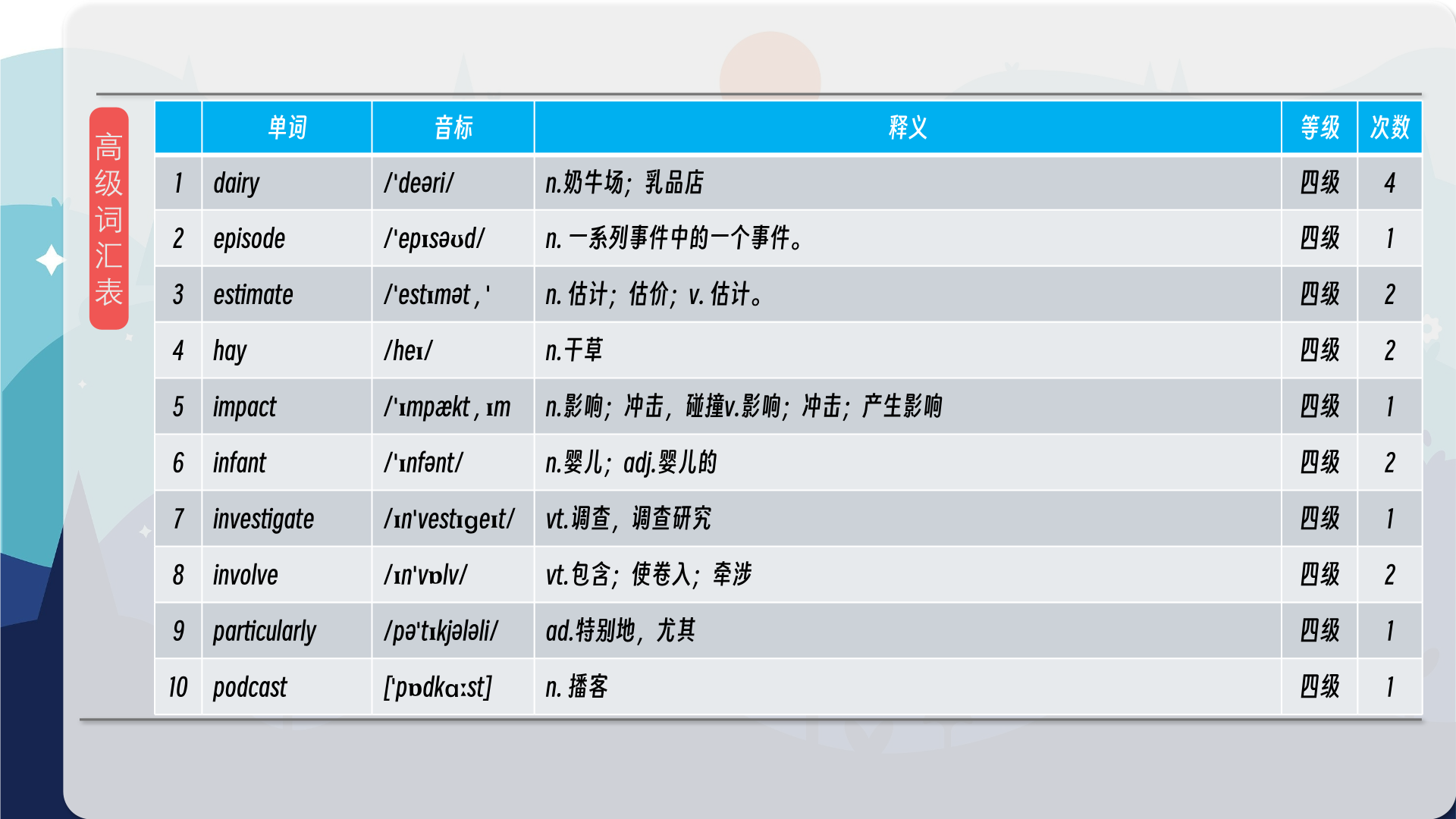
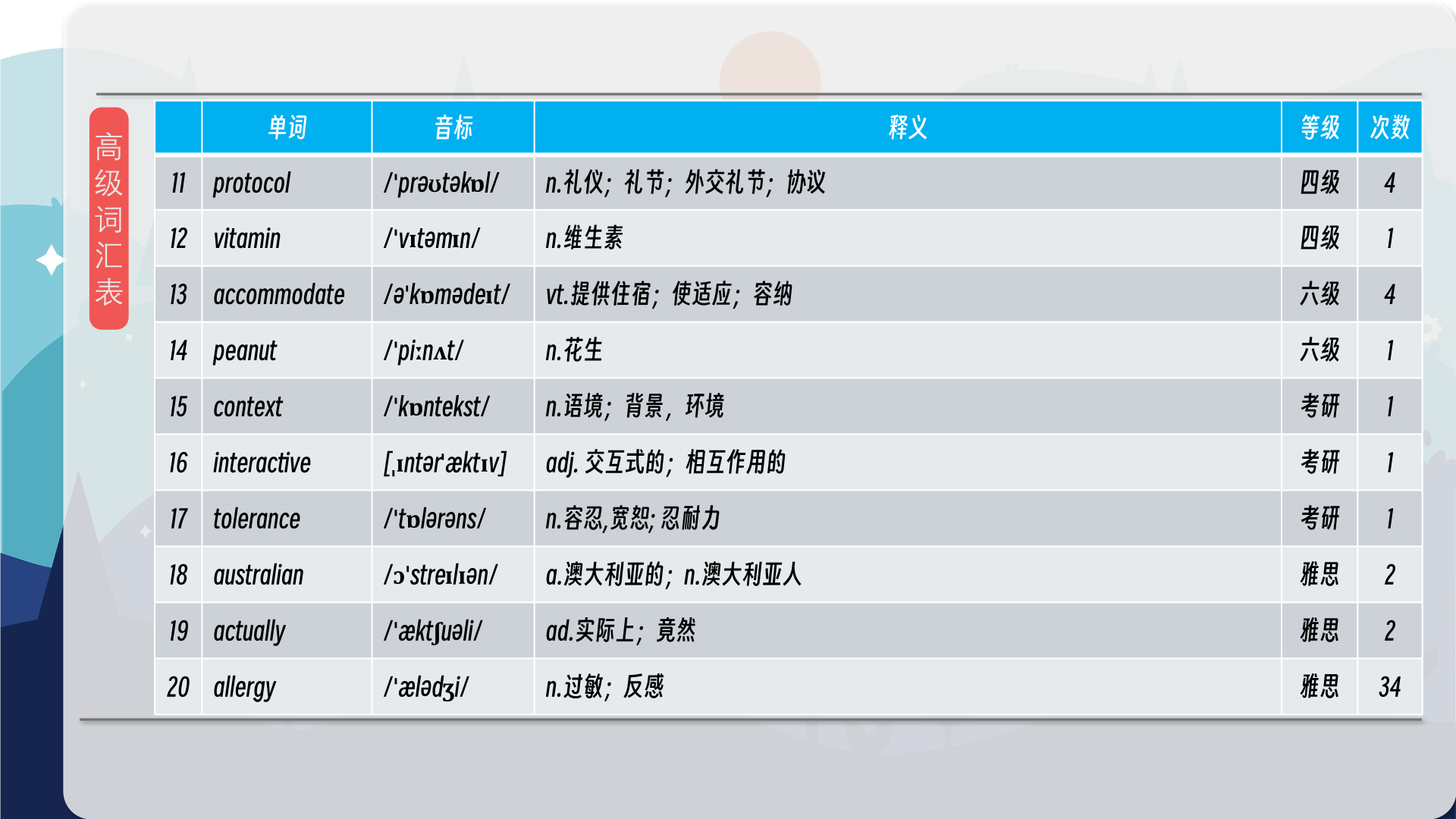
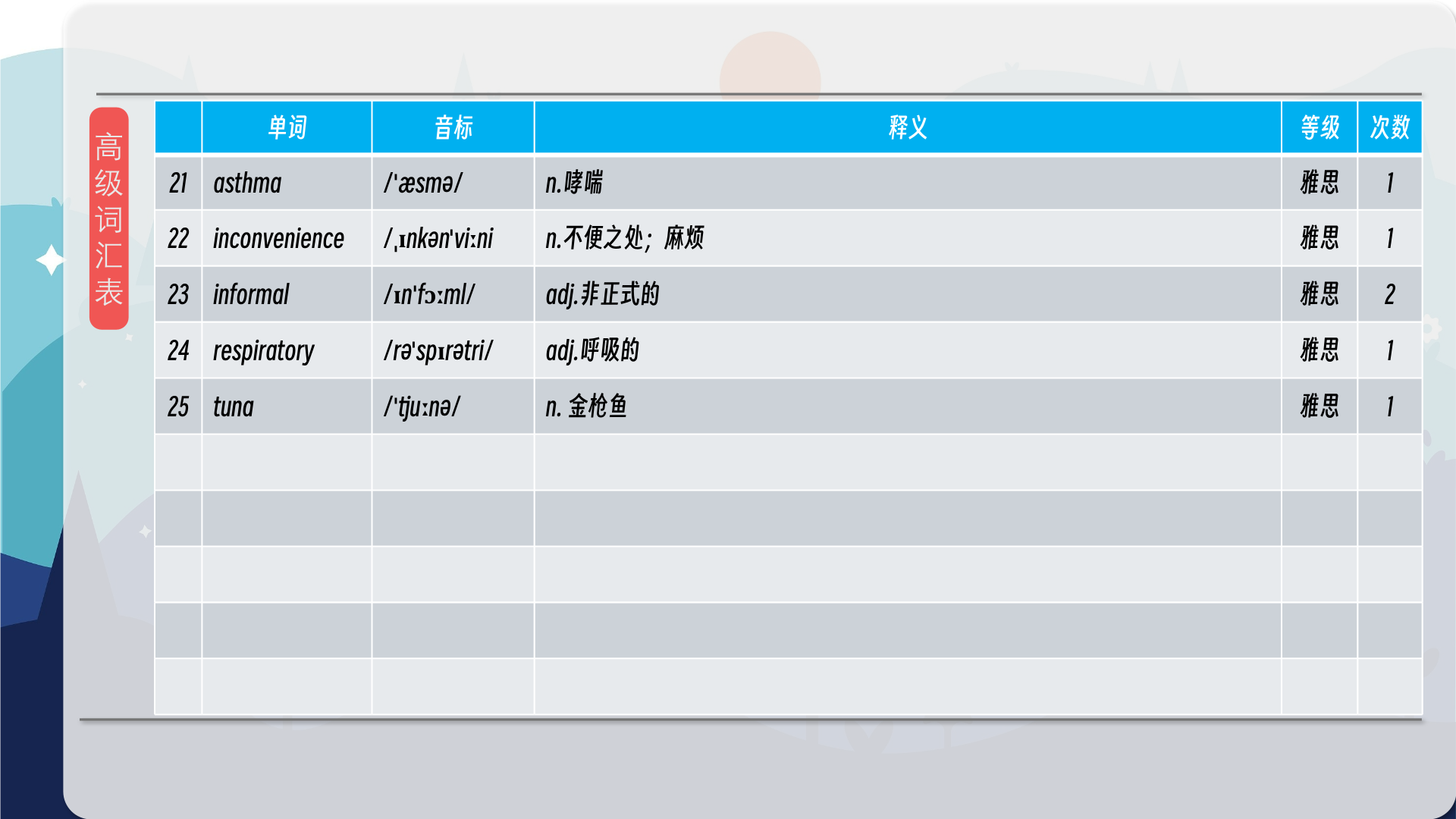

【核心词汇】
call ahead of time
phone before an appointment, or before going somewhere
提前致电
在预约前或去某地前打电话
I’ll call ahead of time to make sure the restaurant is open.
我将提前打电话,以确保餐厅营业。
accommodate
give someone what they need
容纳;提供住宿
给某人提供他们所需要的
The hotel can accommodate up to 500 guests.
这家旅馆最多可容纳500位客人。
protocols
strict rules for how something is done
协议;规程
对事物如何进行的严格规定
Security protocols were tightened after the incident.
事件发生后,安全规程得到加强。
(allergy) capital of the world
a place that is known for (allergies)
(过敏)之都
以(过敏)而闻名的地方
Some people consider certain regions to be the allergy capital of the world due to high pollen counts.
有些人认为某些地区由于花粉含量高,是世界上的过敏之都。
drop off
get lower over time
下降;减少
随着时间的推移而降低
The number of applicants has dropped off significantly this year.
今年申请人数大幅下降。
or so
used to indicate that a number is an estimate, or is not exact
大约;左右
用于表示一个数字是估计的,或是不确切的
The journey will take an hour or so.
这段旅程大约需要一个小时左右。
在公众号里输入6位数字,获取【对话音频、英文文本、中文翻译、核心词汇和高级词汇表】电子档,6位数字【暗号】在文章的最后一张图片,如【220728】,表示22年7月28日这一期。公众号没有的文章说明还没有制作相关资料。年度合集在B站【六分钟英语】工房获取,每年共计300+文档,感谢支持!